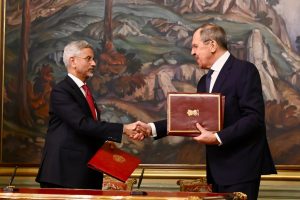Mohamed Zeeshan

When India’s External Affairs Minister Subrahmanyam Jaishankar went to Moscow last week, he appeared to turn the page in India-Russia ties after two years of tightrope walking.
For the better part of the last two years, even as it had maintained neutrality on Ukraine and rapidly expanded trade with Russia, India had been wary of any perceptions of alignment with an isolated Moscow. There had been a pause in the annual bilateral meetings between India’s Prime Minister Narendra Modi and Russia’s President Vladimir Putin. India had chosen to hold the Shanghai Cooperation Organization (SCO) summit virtually last year rather than hosting Putin in New Delhi. It had also conveniently escaped hosting Putin at the G-20 Leaders’ Summit.
Throughout that period, India had continued to import oil and coal from Russia in unprecedented quantities, but New Delhi did so under the perception — deliberate or otherwise — that it had few strategic alternatives to trade with Moscow. There were seldom glowing references to Russia as an Indian ally, and Modi had even publicly lectured Putin about avoiding war.
But the world has since changed.
As Israel has waged an appalling war in Gaza, the tables have turned, and U.S. support for the Israeli government in that war has diluted Washington’s moral high ground. Last month, the U.N. General Assembly voted overwhelmingly in favor of an “immediate humanitarian ceasefire” in Gaza. Only 10 countries, including Israel and the United States, voted against it. In the U.N. Security Council, the U.S. had to resort to a veto to kill a near-unanimous resolution.
Washington’s isolation over Gaza coincided with more bombastic rhetoric from New Delhi. After copping criticism from Western observers for meeting with Putin last week, Jaishankar said, “Please look in the mirror and tell me how you were behaving as a democracy.”
The agenda for bilateral talks between India and Russia has also expanded. When Jaishankar went to Moscow in 2022, there was heavy focus on oil trade, as India rushed to take advantage of discounted Russian crude.
This time, there was much more. In talks with Russia’s Foreign Minister Sergey Lavrov, Jaishankar discussed “the state of multilateralism and the building of a multipolar world order.” Ahead of the meeting, Lavrov said the two countries are interested in “building an international political and economic system that would be open and fair for everyone.”
Progress was also made on other important fronts. The Ukraine war appeared to have derailed military ties between the two countries; in 2022, Russia was buying back arms from India amid losses in Ukraine and crippling sanctions. That had added to larger concerns in New Delhi about Russia’s reliability as a supplier. But Moscow is now making an effort to revive military ties. Last week, Lavrov announced that he had made significant progress with Jaishankar on plans to jointly produce military equipment.
For New Delhi, this could be a major fillip. In the quest to indigenize its defense supplies, India has long hoped for joint development partnerships — in particular with the United States. But progress has been hampered over the years for sundry reasons, including regulatory barriers and industry concerns in the U.S. If India and Russia now begin to jointly develop military technology, that may only make the U.S. more wary; Washington may fear potentially losing trade secrets and technical know-how to Russia via India.
Under the circumstances, India may be tempted to choose Russia over the United States. Ties with Washington have soured in recent months after the U.S. alleged that an Indian government official had directed a murder plot in New York. U.S. President Joe Biden subsequently turned down an invitation to travel to New Delhi for India’s Republic Day parade later this month.
With Russia, on the other hand, there are few causes for irritation. As Jaishankar put it this week, “[Russia] is a relationship that [has] served India well.”
That statement of resounding endorsement would have been more uncomfortable only a year ago, with global public opinion squarely focused on casualties in Ukraine and the moral case against Russia’s unilateral invasion. But with Washington now implicated in a gruesome conflict of its own in the Middle East, India and Russia have recovered more strategic space.
No comments:
Post a Comment